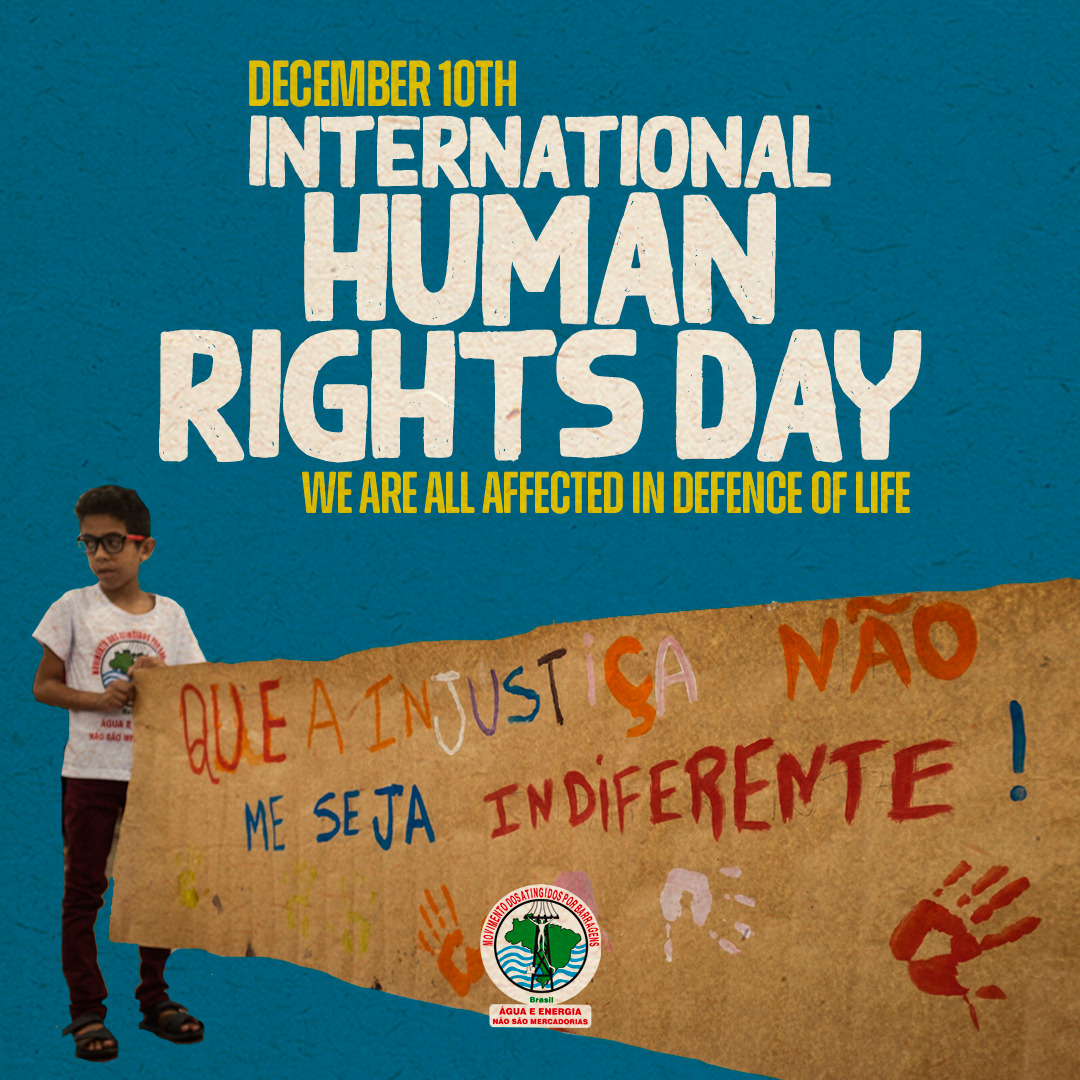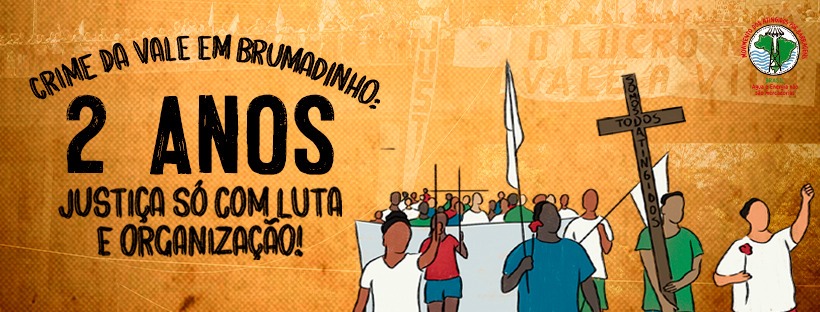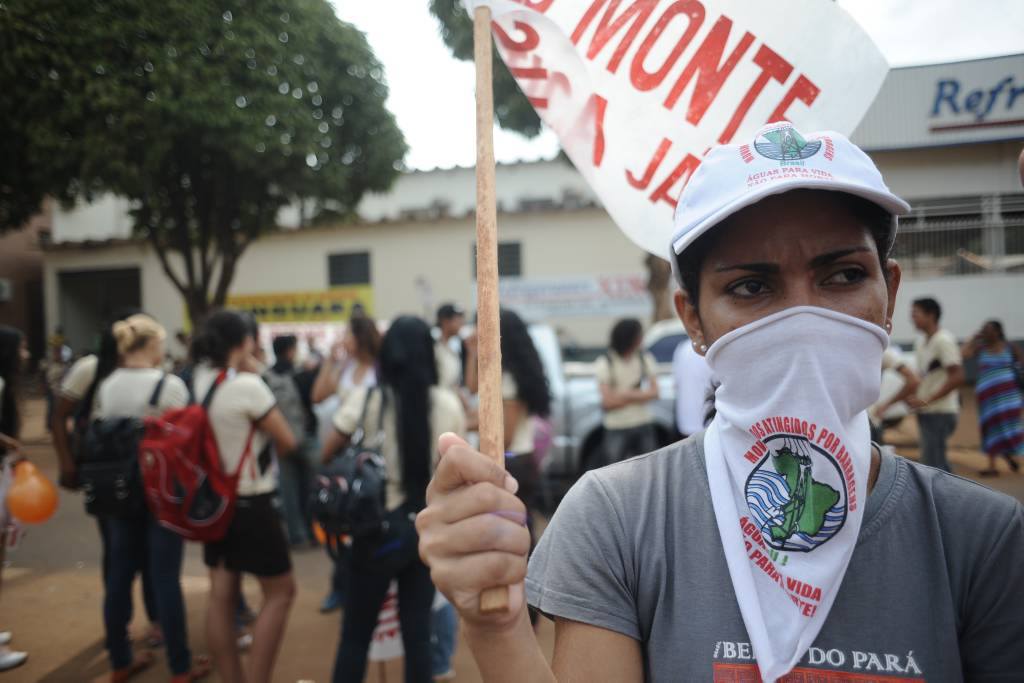December 10th is celebrated internationally as Human Rights Day because on this day in 1948 the Universal Declaration of Human Rights was proclaimed. The Declaration is a standard that should be upheld by all people and nations, and it established the universal protection of human rights, rights that any person anywhere in the world could expect and demand simply for being human.
Despite its importance, more than 70 years after its proclamation, we know that these rights are still disregarded, whether by the state or by companies, in situations of injustice, abuse, and discrimination.
The pandemic has lifted the veil of the deep environmental crisis, social inequality, and racial and gender discrimination. We have grown up in hunger, inequality, destruction, and we are unable to ensure the right to life and health.

This way of realizing people’s rights to health, food, water, and energy through the “markets”, with the privatization of everything important to life, has proved bankrupt and doomed to failure, but extremely profitable for transnational companies. More and more food chains are concentrated in the hands of a few, goods and services are privatized and social and environmental conflicts explode.
In Brazil, this year of 2020 was no different. The lives and living conditions of the Brazilian people have been affected by the criminal policies of the federal government in health and economic management. The withdrawal of rights – labor and social security; the dismantling of public policies such as the Food Acquisition Program (PAA in the acronym in Portuguese), Unified Health System (SUS in Portuguese), and the Bolsa Família social program for vulnerable families; the paralysis of agrarian reform and the non-approval of the rights of those affected by dams are examples.
On the other hand, large companies had their privileges guaranteed, through initiatives to let the cattle pass (in reference to a comment by the Minister of the Environment on unblocking the advance of agribusiness over preserved areas), which caused the advance of environmental destruction, historical fires in the Amazon, Cerrado and Pantanal biomes.
In 2020, Brazil did not sow rights; on the contrary, the country took lives, especially the lives of women, black and poor lives, all with a lot of violence and impunity.
The women and men affected by the disruption of the tailings dams in the Paraopeba (Brumadinho/MG in 2019) and Doce (Mariana/MG in 2015) rivers wish to celebrate this December 10th as a day of justice, for receiving the much-dreamed reparation for their loss and suffering that has been awaited for many years already. But there isn´t much to celebrate, because what we see is the increase in vulnerability, in company profits, and shameful impunity.

The people suffer from the constant threat of the companies withdrawing the little income secured with emergency financial aid programs. They have their right to social participation vilified by Justice itself and they do not even have access to information about what happens in all the decision-making stages of the reparation processes. They are survivors of an elitist judiciary system that is unaware of life’s urgency and the need for fulfillment of their human rights.
The pain of privatization of a country, of the continuity of colonization, is what bitters the families of the state of Amapá in the extreme north of the Amazonia region, who remained several days without access to electricity and continue with the discontinuity of service, due to contractual conflicts between the private companies. Here there is a reversal, so common in our times: first private and economic interests, then human rights.
An important struggle of the Movimento dos Atingidos por Barragens – MAB this year was the access to electricity as an essential condition for the reproduction of families’ lives. Without energy, there is no food and there is no internet for children to attend their classes. Therefore, energy should be part of the basic food basket of the people, like cooking gas and electrical energy.
We carried out an immense campaign in defence of the Social Energy Tariff that has been a right in the country for more than 10 years, but it has never been fully put into practice. Our struggle has managed to benefit more than 2 million families who now have their right recognized to the social energy tariff. However, there are still 11 million families who have this right and the companies and irregular government agencies do not take the necessary steps to ensure it.
Even with several limits to the progress of the rights of the populations affected by dams, the MAB has achieved some important advances in the reform of the National Policy for Dam Safety (PNSB), Law n. 12334/2010, with the advance of the taxation of some fines and the prohibition of upstream dams (like the ones that burst in Minas Gerais).
The National Policy on the Rights of People Affected by Dams (PNAB) is still pending approval in the National Congress, being in progress in the Federal Senate, which could advance human rights standards for the population affected by dams in the country.
All of this shows us what we already know and have been debating and denouncing for a long time. Justice and human rights are conquered only with struggle and organization. For this reason, let us celebrate the struggle and organization of the Brazilian people on this day of human rights and keep blossoming rights, flowers, bread, water, and energy.
Water and energy are not commodities! They are human rights!
This article first appeared on the website of Movimento dos Atingidos por Barragens – MAB.

